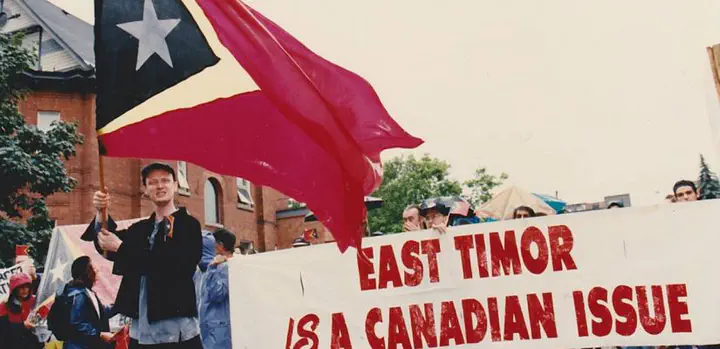Discursive Opportunities and the Motivational Framing of Human Rights Activism for East Timor; A Cross-National Analysis

In this article, published in a Mobilization, we look at the global solidarity movement for East Timor’s use of strategic, nationally grounded motivational framing and their efforts to gain concessions from their national governments. We identified how solidarity activists invoked nationalist discourses to legitimize recognition and motivate action on East Timor, re-orient foreign policy, and shame governments for failing to uphold this moral order. Movement organizations attempted to reconstruct shared history and national identities as compatible with promoting human rights abroad and we show how distinct national political contexts shaped and enabled different framing outcomes. We identify three distinct, cross-national differences in the global solidarity movements' motivational framing and politics of shame: (1) Canadian groups mobilized a humanitarian-peacekeeping frame, (2) US solidarity groups tapped into historical and contemporary cultural myths and memories that privilege democracy, freedom, and autonomy, concomitant with discourses of choice and equality, to produce an exceptionalist-democratic frame, and (3) Australian activists drew from a remembrance-moral debt frame. The discursive opportunities afforded to solidarity activists in a national and global context - such as the language of human rights - were mediated through a local, nationally-bound field by ‘harnessing hegemony’ as a discursive tactic for moral accountability and the mobilization of shame.
Abstract: Drawing from previously untapped archival data, our research undertakes a cross-national analysis to understand how critical organizations within the global solidarity movement for East Timor in Canada, the United States, and Australia adapted their human rights claims and rhetorical interventions to their specific national contexts to produce politically and culturally salient motivational frames that resonated with their states' discourses of national identity and foreign policy to support humanitarian intervention in East Timor. We identify cross-national differences in the framing of their political discourse: (1) Canadian groups mobilized a humanitarian-peacekeeping frame, (2) US solidarity groups tapped into a democratic-exceptionalist frame, and (3) Australian activists drew from a remembrance-moral debt frame. We conclude by underscoring the importance of discursive opportunities and national historical contexts for studying the mobilization of human rights and cross-national variations in motivational framing.
Image can be found at https://historybeyondborders.ca/?p=220